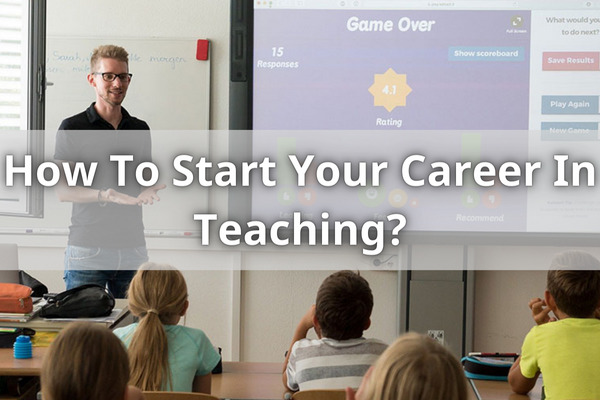Education And Teaching Careers: Future For A Bright Tomorrow
Education and teaching careers are incredibly rewarding paths to take. It takes a special kind of person to be dedicated enough to make it their life’s work, but those who do will find that it’s highly fulfilling. Teaching isn’t just about imparting knowledge; it can also shape the future generations for the better.
In this article, we’ll explore what makes education and teaching such an attractive career path, as well as how one can go about pursuing it.
Education Career Paths
When it comes to education and teaching careers, the possibilities are nearly endless. From traditional roles like teachers and administrators, to cutting-edge specializations like library media specialists or school social workers, there’s something for everyone.
Each of these career paths offers unique opportunities to make a positive impact in students’ lives while also enjoying job security and competitive salaries.
For those looking to get into administration, positions such as principals or curriculum directors may be available. With an administrative role, you’ll have greater control over the direction of your school district or organization while overseeing the work of teachers and other staff members. Additionally, many educational organizations offer competitive salary packages with attractive benefits.
Those interested in counseling can pursue a degree in school psychology or take courses related to student behavior management. School counselors often provide guidance on academic issues ranging from course selection to college planning advice, as well as mental health services for students struggling with emotional problems.
For non-traditional learners who need extra support outside of the classroom, alternative education settings can also provide valuable resources which allow them to reach their full potential.
Highest Paying Jobs In Education
Naturally, earnings for jobs in education and teaching vary widely depending on the position. Higher-level employees, such college professors or school administrators, often earn more than individuals who have lower-level jobs, like teachers’ assistants. There are, however, a few occupations that pay much more than others, even within these broad categories.
School principals top the list when it comes to highest paying educational professions. With an average salary ranging from $80k to over $100k per year, this is a highly coveted position with many benefits beyond just income potential.
District superintendents also command high wages for their expertise in leading multiple schools at once; they earn around $125k annually.
Meanwhile, postsecondary instructors have the opportunity to bring home some serious money. College professors typically receive six-figure incomes while university presidents often reach seven figures or more depending on experience and institution size.
It’s clear that those willing to dedicate themselves to learning and sharing knowledge can be rewarded handsomely for their efforts in education and teaching fields.
Growing Careers In Education

Education is a great topic to concentrate on if you want to change the world and have a job that will always be in demand. From teachers to principals to researchers, there are many opportunities to pursue within this growing field.
Let’s look at some of the positions in the educational industry that are expanding the quickest:
- Educational Consultants – With the goal of assisting schools, universities, and other organizations in creating learning programs and enhancing academic achievement, educational consultants collaborate with them. They also pinpoint issues and offer answers to enhance student performance.
- Instructional Coordinators – Instructional coordinators oversee curriculum development, staff training, classroom materials selection and more. They ensure that all aspects of instruction align with district standards and goals.
Online Instructors – With advances in technology, online instructors are becoming increasingly popular as they can offer students flexibility when it comes to learning. These educators teach classes remotely using web conferencing tools such as Skype or Zoom.
Learning Technology Specialists – Learning technology specialists evaluate existing technologies used in classrooms and develop new ones based on current trends in teaching and learning styles. They may also assist faculty members with implementing new technologies into their lesson plans.
Technology has had a massive impact on education careers over the past decade. We’ve seen how remote learning platforms enable students from around the world access to quality education experiences regardless of their location or economic background; we’ve seen how data science techniques allow us to better understand our learners’ needs so that we can tailor curricula accordingly; we’ve even seen how virtual reality (VR) simulations create immersive experiences which bolster engagement levels among our students!
As these advancements continue to unfold, it’s clear that those working within this space must stay up-to-date with technological developments if they want remain competitive within the industry – but it’s worth noting that innovation isn’t just limited to hardware or software implementations – digital pedagogy offers exciting possibilities too!
What Do Teachers Do?
With the increasing demand for educated professionals across multiple fields, education and teaching careers have become increasingly attractive to those looking for a secure and rewarding career. As a result, it’s critical to comprehend what teachers accomplish and how they might support pupils in achieving their objectives.
At its core, teaching involves creating an environment in which students can learn effectively. This includes developing lesson plans, assessing student progress, leading classroom discussions, and providing meaningful feedback on assignments.
Teachers must also be able to identify each student’s requirements by monitoring their behavior and responding appropriately. In order to deliver high-quality training that satisfies contemporary requirements, teachers also need to remain current with educational trends and initiatives.
In addition to these academic responsibilities, instructors are in charge of upholding safety standards at all times and preserving order in the classroom. To this end, they may need to develop rules or consequences for poor behavior as well as show care and respect towards every student regardless of their background or ability level.
Ultimately, effective teachers serve not only as educators but also mentors who help shape young minds into successful adults.
Teaching Shortage And Demand
The shortage of teachers and the increasing demand for qualified educators has created a dilemma in education. We’re seeing an influx of students at all levels, but not enough personnel to support them adequately.
With limited resources available, it’s becoming increasingly difficult for school districts to fill open positions with highly-qualified applicants. Governmental policies are playing a key role in addressing this issue, as they provide incentives for individuals who enter the teaching profession or remain within it long term.
From student loan forgiveness programs to offering competitive salaries, these measures can help attract more people into the field. Additionally, initiatives such as professional development opportunities and increased funding for teacher preparation can ensure that today’s educators have access to necessary training and resources needed to excel in their respective roles.
Ultimately, if we want our educational system to continue thriving, it’s essential that we prioritize both recruitment and retention efforts so that every learner is provided with equal access to quality instruction from dedicated professionals.
The Impact Of Covid-19 And Remote Learning On Education Careers
The COVID-19 pandemic has had a seismic effect on the educational landscape, resulting in dramatic changes to how teachers and students approach their roles. In what feels like an instant, educators have had to adjust to remote learning and hybrid teaching environments while also dealing with the pressures of job security and diminished resources.
This sudden shift has challenged both veteran and novice educators alike as they try to make sense of new technologies and find ways to keep students engaged. For many, this transition has been difficult due its lack of planning or prior experience. As classrooms went virtual overnight, there was little time for schools and districts to plan out long-term strategies or procure necessary technology; instead, they were forced into quick decision making that lacked the flexibility so often needed when working with children.
These abrupt changes have left teachers scrambling to learn new software applications and figure out creative solutions for maintaining student engagement from afar – all while facing uncertain futures related to job stability and funding cuts. Though these challenges are immense, it’s important not to underestimate the creativity of educators during such trying times.
Schools continue to explore innovative approaches for educating their students virtually, allowing them access tools previously unavailable outside the classroom setting – creating unique pathways for growth that may transform education into something even greater than before.
Inclusion And Diversity In Education

The COVID-19 pandemic has drastically impacted the education sector and altered how teaching careers have been conducted, particularly in terms of remote learning. Yet, it’s also crucial to take into account other aspects, such as diversity, equity, and inclusion, that affect educational institutions.
There are a number of measures that may be used to promote a more inclusive atmosphere for both instructors and students, including:
- Encourage the representation of varied backgrounds in the educational system by hiring personnel with a variety of backgrounds who may contribute fresh insights and experiences;
- Create an open dialogue between educators and their students so they feel comfortable raising concerns or issues related to social justice;
- Utilize technology platforms to support virtual learning environments where all individuals are welcomed regardless of their background or beliefs.
No matter their color, gender identity, socioeconomic background, degree of skill, or any other characteristic, everyone should be able to access chances for great education thanks to these policies. Ultimately, fostering an atmosphere of respect and acceptance at every stage of the educational process will benefit all involved while providing invaluable lessons on tolerance and understanding towards one another.
Teacher Wellbeing And Self-Care
Teachers often lead busy, stressful lives that can leave them feeling overwhelmed and burned out. As such, it is important to take steps towards maintaining a healthy work-life balance and practicing self-care in order to keep up with the demands of teaching.
Practicing self-care not only helps teachers feel more refreshed and energized for their jobs but also ensures they stay emotionally and mentally healthy.
One way to practice self-care as an educator is by taking regular breaks throughout the day. This could mean using your lunch break or 15 minutes of free time during class to relax or engage in an activity you enjoy.
In order to be rested for the next school day, strive to obtain adequate sleep each night. Exercise, such as yoga or jogging, can also be helpful for reducing stress and maintaining energy levels.
Lastly, having a supporting network of loved ones, friends, coworkers, and mentors might aid when you need emotional support. These social connections can act as a reminder of why we chose this career path in the first place: our passion for helping students learn and grow! Spending quality time with loved ones can help us remember what’s truly important while providing much needed rest from our demanding occupations.
Why Pursue A Career In Teaching?

Aspiring to become a teacher is more than just an occupation—it’s a calling. Teaching offers its own unique set of rewards that few other careers can match, including:
- Making a lasting impact on students’ lives
- Having the opportunity to collaborate and learn from colleagues
- Working with the latest technology in classrooms around the world
- Helping foster creativity and critical thinking skills
- Developing meaningful relationships with fellow educators and administrators.
The personal and professional benefits of teaching are immense. Not only do teachers get to share their knowledge with others, but they also gain invaluable experience in communication, problem solving, collaboration, leadership, and adaptability as part of their everyday work.
Most importantly, teaching provides job security and competitive salary packages for those who choose it as a career path. With educational resources at an all time high due to advancements in technology, now is a great time to pursue a career in education!
Teaching Career Paths
Teaching is a rewarding profession that offers many opportunities for growth and development. With so many options, it can be overwhelming to decide which path to take – but with the right guidance and research, you can find the perfect fit!
From Reading Intervention to Gifted and Talented Education, there are numerous ways to advance your teaching career. For those interested in helping students increase their reading skills, Reading Intervention may be the best option. Special Educators focus on providing support and curriculum modifications for students of all ages with disabilities or learning difficulties.
For educators looking to help adults learn new concepts and expand their knowledge base, Adult Education and Training could provide them with the opportunity to do just that. Alternatively, ESL (English as a Second Language) teachers can help non-native English speakers learn how to communicate fluently while they develop an understanding of American culture.
Curriculum instruction provides another avenue for educators who want to make a difference in the classroom by designing lesson plans and leading team activities. On the other hand, those passionate about cultivating creative minds might opt for teaching art, music or physical education instead – allowing them to guide students through artistic expression or physical activity within specific curriculums.
Whatever route you choose, there’s no doubt that committing yourself to any of these paths will not only result in personal success but also lead to positive outcomes for future generations.
How To Start Your Career In Teaching?

Getting into teaching requires both an education degree and teaching licensure, so let’s start by talking about the educational qualifications you’ll need to get a job.
Then, we’ll discuss what kind of teaching licensure you’ll need to start your career.
Education Degrees
If you’re interested in starting a career in teaching, then it’s important to understand the different types of education degrees available.
An Associate Degree in Education provides an entry-level route into the field as most jobs require at least this level of qualification. With an associate degree, you could become a childcare worker or preschool teacher and work your way up from there.
A Bachelor’s Degree might be required for more specialized roles such as ESL Teacher or High School Teacher.
Moving on to higher levels, a Master’s Degree can open doors to administrative positions like Assistant Principal or Instructional Coordinator.
Finally, those looking to teach at a postsecondary level should consider investing time and resources into achieving their Doctorate in Education which may also qualify them for roles such as School Principal or Training Manager.
Teaching Licensure
To make sure you’re qualified to teach in your state, it’s important to get the necessary teaching licensure. Depending on where you live, this might involve taking additional courses or exams and passing a background check.
Once you’ve obtained your license, you’ll be able to start applying for jobs as an educator with confidence. It also makes sense to stay up-to-date on any new requirements that may arise so that you can keep your license current.
With the right qualifications and experience, you could soon find yourself well on your way to starting a successful career in education!
How To Advance Your Career In Teaching?
Advancing your career in teaching can seem like a daunting prospect, but with the right skills and strategies, you’ll be well on your way to achieving professional success.
Here are four key steps that can help make it happen:
- Get certified or licensed: Depending on where you work, certifications may be optional; however, having them is always beneficial. This will show employers that you have met certain standards of education and training related to teaching.
- Pursue continuing education opportunities: Keeping up-to-date with educational trends and practices through courses, workshops, seminars and other forms of professional development will demonstrate to potential employers that you take your job seriously. It also allows you to stay ahead of the curve when new technology or methods become available for classroom instruction.
- Networking & Professional Development Opportunities: Joining professional organizations such as teacher associations or online groups dedicated to educating students can open doors for furthering your career. By networking with peers and engaging in group discussions about best practices in education, you’ll gain valuable knowledge while building relationships which could lead to future opportunities.
- Mentorship: Having an experienced mentor who can provide guidance along the way is invaluable. Whether they are another teacher at school or someone outside of it who has worked in the field for many years – having somebody there to answer questions and offer advice about how to advance professionally can be extremely helpful.
The journey towards advancing one’s career does not end here though – it requires dedication, hard work, perseverance and resilience from teachers if they want to reach their goals!
Taking these steps now will set yourself up for long term success by providing a strong foundation upon which more advanced skillsets can be built over time.
How To Switch Your Career To Teaching?

Making the transition to a career in teaching can be daunting. But with some preparation and an open mind, you can make the jump into this rewarding profession. Teaching is a wonderful way to help others learn, grow, and impact lives—and if you’re coming from another field, there are plenty of ways for your skills to transfer over.
Take the time to explore certifications that meet your individual needs and goals. Alternative certification programs offer flexibility for those who have already completed college coursework or hold a master’s degree but haven’t earned their traditional teacher licensure yet. You may also find yourself eligible for special state-level grants designed specifically for individuals looking to switch careers into teaching.
It’s important to consider how your previous experiences will fit into a classroom setting too; many of the same core principles apply across industries when it comes to helping people progress through learning opportunities. With patience and understanding, you’ll soon discover all the unique qualities you bring as an educator!
The world of education offers endless possibilities—with every lesson plan, each student brings something new and exciting that requires teachers to adapt quickly and think outside the box. Making the decision to pursue teaching full-time takes courage and dedication, but it can ultimately lead you down a path of personal fulfillment where both you and your students benefit equally from your hard work!
Where Can You Work As A Teaching Professional?
Teaching professionals have a broad range of work environments to choose from. From traditional classrooms to international teaching opportunities, there is something for everyone. Here we will explore the various settings in which teachers can find employment and satisfaction in their chosen profession.
The most common place you will find educators is in a traditional school setting. This could be elementary schools, middle schools, high schools or post-secondary institutions like universities or technical colleges. Each of these settings has its own unique challenges and rewards that come with it, allowing teachers to hone their skills as instructors while providing students with an excellent education experience.
In addition to traditional educational settings, there are many alternative options available for those seeking out different types of engagements within the field.
International teaching opportunities offer a chance to travel and see the world while still doing meaningful educational work; alternative education settings such as homeschooling or private tutoring services allow teachers to tailor lesson plans directly to meet the needs of individual students; finally virtual learning platforms provide another avenue for creative instruction by utilizing technology and digital resources for content delivery.
These are only some of the possibilities available when considering a career path in education – each option brings its own set of benefits and drawbacks that should be taken into consideration before making any decisions regarding where one wishes to teach professionally:
- Traditional Classroom Settings
- International Teaching Opportunities
- Alternative Education Settings (homeschooling, private tutoring)
- Virtual Learning Platforms
- Online Teaching Platforms.
Scholarships, Grants, And Financial Aid Opportunities For Aspiring Educators

Although beginning a career in teaching requires time and money, it can be tremendously rewarding. Thankfully, students who want to pursue degrees or certificates in education have access to a wide range of scholarships, grants, and financial assistance options.
Here are some suggestions for applying to these programs so that you can make sure you have access to the resources that can assist finance your training.
Start by researching local and national scholarship options. Many organizations offer awards specifically tailored towards aspiring teachers.
Additionally, look into government-backed grants such as Federal Pell Grants which provide need-based funds for postsecondary education. Your school’s Financial Aid office may also be able to point you toward other sources of funding.
Finally, take advantage of any employer-sponsored tuition reimbursement plans that might be offered at the place you work – this is especially beneficial if you plan on working through college so you don’t have to pay out of pocket while earning your degree or certification.
With some research and preparation, potential educators can find cost effective ways to reach their educational goals without taking on too much debt.
Technology In Education And Its Impact On Teaching Careers
The role of technology in education and its impact on teaching careers is immense. Teachers may now deliver lessons more creatively, effectively, and efficiently thanks to technology.
The way we teach and learn has changed significantly as a result of significant advancements in educational technology over the last ten years alone. For instance, educators may now design virtual classrooms where they can collaborate on projects with learners from all over the world. Also, teachers may use a variety of digital technologies including interactive whiteboards, online tests, video conferencing programs, and augmented reality programs to involve pupils in their education.
For educators who wish to use cutting-edge technologies and innovate in the classroom, technology has opened up new career opportunities. Educators today need to understand how to use these technologies effectively and develop innovative approaches for integrating them into their lessons.
Here are four ways educators can leverage technology:
- Create engaging experiences by using emerging technologies such as augmented reality or virtual reality simulations
- Develop online courses using multimedia content like videos, podcasts, or webinars
- Utilize data analysis tools to identify areas of improvement in student performance
- Use artificial intelligence (AI) algorithms to personalize instruction based on individual student needs
These technological advancements have significantly transformed teaching careers by providing opportunities for greater creativity and innovation while improving outcomes for both teachers and students alike. The possibilities created by this ever-evolving landscape continue to open doors for those willing to embrace change and stretch themselves beyond traditional boundaries.
Resources For Teaching Majors

Let’s start with professional organizations – they can be a great source of resources for teaching majors. From networking opportunities to scholarships, these organizations offer a wealth of benefits.
Next, let’s talk about open courseware – there’s an abundance of free online classes and materials available.
Finally, there are so many publications out there that are tailored to teaching majors – this can help aspiring teachers stay up to date on the latest developments in their field.
Professional Organizations
Professional groups are one of the finest options if you want to advance your teaching career. These organizations give instructors access to unique job listings, worthwhile networking opportunities, and practical guidance on how to grow in their profession.
Professional organizations frequently conduct seminars and workshops that can assist educators in keeping abreast of the most recent developments in educational theory and practice. They also serve as a great way for members to connect with other professionals from around the country or even internationally!
So don’t miss out – join a professional organization today and start building your network of contacts in the field of education!
Open Courseware
Now that you’ve explored the benefits of joining a professional organization, why not take advantage of open courseware?
This is an amazing resource for educators as it provides access to free online courses and lectures from some of the top universities in the world.
It’s also great for staying ahead of developing trends and techniques without having to leave your home or office!
Plus, since these materials are often offered on demand, you can learn at your own pace and work around any other commitments.
So go ahead and explore this valuable source today – there’s no better way to expand your knowledge!
Publications
Now that you’ve taken advantage of open courseware, let’s turn our attention to publications.
There are a number of journals and magazines out there devoted to teaching majors, making it easy for educators like yourself to stay up-to-date on the latest research and trends in education.
Plus, many of these publications offer additional resources such as lesson plans and classroom activities that can help make your job easier.
So don’t forget about checking out what’s available – it could be just what you need to take your career to the next level!
Careers In Education
Teaching majors have a lot of options for careers in education. From working as a teacher in an elementary or secondary school, to holding administrative roles such as principal or director of curriculum and instruction, the field offers many opportunities for those with specialized knowledge.
With the demand for qualified educators continuing to rise, there has never been a better time to pursue a career in the field of education.
The first step is often obtaining the necessary credentials and certifications needed to become employed by schools and other educational organizations. Depending on where you live, these requirements may vary significantly; however, most teaching positions require at least a bachelor’s degree in Education or related fields along with state-issued certification.
Additionally, some employers might look favorably upon candidates who hold advanced degrees like Master’s Degrees or Doctorates from accredited universities.
In terms of salary range, it depends heavily on factors such as experience level and location. For instance, teachers in states like California can earn anywhere between $50K – $90K annually while administrators typically make more than that depending on their role within the organization.
However, it goes beyond just monetary compensation; jobs in education also offer very rewarding experiences both professionally and personally when one gets to see firsthand how they are positively impacting lives every day.
Careers Outside Of Education

Teaching and education skills can be used in many different industries, beyond traditional educational settings. Here are three alternative career paths you may want to consider if you possess teaching and education experience:
Careers in Nonprofit Organizations
- Program Managers
- Outreach Coordinators
- Grant Writers
Careers in the Arts
- Arts Educators
- Museum Curators/Educators
- Art Directors
Careers in Business & Technology
- Training Specialists
- Instructional Designers
- Corporate Trainers/Instructors
No matter which industry you choose to pursue, having a background of teaching and education gives your resume an extra edge over other applicants who lack that special set of skills. With versatility and creativity, there is no limit to what you can do with your knowledge or where it might take you!
Different Types Of Teaching Jobs, Careers, And Education Requirements
Teaching is a rewarding and challenging career, with many opportunities to make an impact on the lives of others. From working in the classroom with students to coaching sports teams or teaching adults in their professional fields, there are a variety of paths one can take when considering entering into education. No matter what route you choose, each requires its own unique set of qualifications and credentials.
Elementary school teachers typically must have at least a bachelor’s degree in elementary education as well as a state license or certification. Secondary school educators usually require both a bachelor’s and master’s degree specific to their subject area, along with licensure from their state board of education. Beyond traditional classrooms settings, there are also special education positions available for individuals who possess additional certifications related to working with students who have disabilities or learning challenges.
For those interested in teaching extracurricular activities like music, art, dance, drama or physical education classes they will need specialized training or experience depending on what field they wish to teach. Adult educational instructors often require advanced degrees within their field but may not necessarily need any type of formal teacher licensing if it is required by law where they plan to work.
Regardless of which path you decide on, having knowledge about various education requirements can help ensure you meet all necessary qualifications before taking the leap into your dream career!
Conclusion
I’m excited to pursue a career in teaching and education. With the right qualifications, I can find the perfect job for me.
Furthermore, there are many ways to advance my career through continued learning, professional development opportunities, and utilization of technology in the classroom.
It’s also important to create an inclusive environment that encourages all students to feel safe and supported in their learning journey.
Overall, pursuing a career in teaching is both rewarding and challenging but with dedication and hard work it will be worth every effort!







